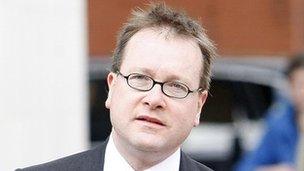Attorney General John Larkin hits headlines for wrong reasons
- Published

John Larkin has made some controversial interventions recently
When John Larkin was appointed two years ago as Northern Ireland's first Attorney General since 1972 no one doubted that the Stormont Executive had picked a brilliant lawyer.
The Belfast-born barrister had been a professor of criminal law at Trinity College in Dublin and a powerful advocate in numerous high profile court cases.
But what would Mr Larkin's political antennae be like?
Back in the early 1980s he was involved with the Alliance Party, but gave up any active involvement to concentrate on the law.
In the courts, Mr Larkin had some well documented dealings with politicians, including a bruising exchange with Ian Paisley Jr during a contempt of court case.
However, no-one would have predicted then that the new attorney general would stir controversy at Westminster after taking legal action against the former Secretary of State Peter Hain.
Nor could the latest controversies have been foreseen regarding the Stormont Justice Committee's handling of abortion or the European Human Rights Court's consideration of gay adoption.
As attorney general, Mr Larkin can sit in on meetings of the Stormont power-sharing executive, as its chief legal adviser for both civil and criminal matters.
He regularly gives evidence to assembly committees.
He is able to participate, but not vote, in the proceedings of the assembly, although he has yet to appear within Stormont's main chamber.
Mr Larkin is the executive's most senior representative in the courts and has appeared, for instance, for the Health Department in judicial reviews dealing with the department's lengthy delay in issuing guidelines on abortion and the ban on gay couples adopting children.
Earlier this month Mr Justice Treacy ruled that the ban on gay adoption was unlawful.
However, the Health Department is planning an appeal, and, prior to Mr Justice Treacy's ruling, the Stormont attorney general had already written to the European Court of Human Rights defending the right of regions to opt out of same sex adoption.
Mr Larkin was intervening in relation to an Austrian test case, which could set a precedent across Europe.
But the UK government has taken the unusual step of making it clear, through correspondence with the court and a Lords written answer, that the Larkin submission does not represent London's position.
Hain case
This isn't the first instance of tension between the Stormont attorney general and London.
Mr Larkin's decision to use the ancient offence of "scandalising the court" to prosecute Mr Hain over the former secretary of state's memoirs sparked criticism at Westminster, with even the prime minister expressing concern.
Eventually the case was settled when Mr Hain said it had never been his intention to undermine the administration of justice in Northern Ireland.
In relation to the past, Mr Larkin has used his powers to refer a number of conflict-related deaths back into the court system for fresh inquests.
But looking forward, it could be the controversial issue of abortion which poses the most questions for the attorney general.
Mr Larkin's offer to assist the justice committee's investigation into whether the new Marie Stopes clinic in Belfast is operating within the law raised eyebrows.
For the executive's chief legal adviser to give evidence to the committee on his interpretation of the strict law on abortion in Northern Ireland was run of the mill stuff.
But for him to suggest that he could question witnesses from the clinic on behalf of the justice committee appeared to push the limits of his job description, even if Mr Larkin himself viewed it as part of his overall duty to act as a guardian of the rule of law.
When Mr Larkin's 2008 radio interview emerged from the archive, in which he compared abortion to shooting a new born baby, it was natural that questions would be asked about how much personal baggage he brings to his consideration of the issue.
With all the Stormont power-brokers avowedly pro-life, sharing their anti-abortion stance may do Mr Larkin no harm politically.
But whilst ministers may be happy to have a fearless advocate on their side when it comes to legal challenges, they may feel concerned that John Larkin's willingness to expand his role has been generating the wrong kind of headlines.
- Published24 October 2012
- Published19 October 2012